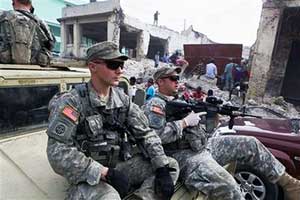U.S. occupation of Haiti disrupts rescue mission
Published Jan 27, 2010 4:54 PM
Following are excerpts from a talk by Richard Kossally at a Jan. 22
Workers World meeting in New York.
|
U.S. Army soldiers patrol downtown
Port-au-Prince, Jan. 26.
|
The relief effort in Haiti is happening despite a lack of any real
mobilization on the part of the U.S. on the ground there. [The U.S.’s]
main priority was not to rescue those trapped under rubble nor to provide
relief to survivors of the quake.
Even in the best of circumstances, a quake like this requires an immediate
response to minimize loss of life and to get medical treatment, food and water
to those who need it. With complete control of the airport, and having been
granted total control for security, the Pentagon is setting up what resembles a
military occupation rather than coordinating a rescue and recovery effort.
Ten days after the earthquake, there is still no apparatus set up to distribute
much of the supplies that have reached the country and are sitting in the
airport. There are pain medications and antibiotics on the tarmac while
amputations are taking place without them. No doubt, a lot of these vital
supplies will become unusable due to lack of refrigeration.
This willful negligence can be measured in lives and limbs lost. Minor injuries
are resulting in amputations because people are not getting timely treatment.
Amputations account for the vast majority of surgeries that have taken place
since Jan 12.
As of Jan. 21, confirmed deaths were about 75,000, with estimates that they
could reach 200,000, with 1 million to 2 million people displaced and 200,000
people injured.
Sanjay Gupta is a medical doctor and a media personality who was in the running
to be surgeon general after Barack Obama won the presidency. He is in Haiti and
this morning [Jan. 22] he was on CNN. He got access to the airport and was able
to get a bagful of medications that he drove over to a local hospital.
The hospital had been in need of these supplies for over a week and they were
sitting at the airport just because of a lack of will or plan to help suffering
people. The U.S. role is downright criminal. Many people outside the airport
wondered when the aid inside would be distributed. A major complaint is that
the United Nations, which is responsible for delivering aid, is not
coordinating their efforts with people who can distribute aid effectively in
neighborhoods around Port-au-Prince.
There are real relief workers in Haiti doing invaluable work. Fifty search and
rescue teams over the past week rescued 123 people alive from the rubble.
Eighteen permanent health facilities and temporary field hospitals are now
operating.
This effort could have been much greater if the U.S. government had responded
with rescue and earthmoving equipment, etc., instead of 10,000 troops and an
aircraft carrier carrying no aid. I once deployed on an aircraft carrier. They
are huge floating cities. You can put just about anything on an aircraft
carrier.
The U.S.S. Carl Vinson had helicopters aboard and helicopters can be invaluable
in rescue efforts, but the sidewinder missiles on them can play no part in
rescuing anyone. Earlier in the week a plane had been flying overhead playing a
message from the U.S. ambassador to Haiti, discouraging people from trying to
flee to the U.S. because they would be turned back.
U.N. Secretary General Ban Ki Moon said that in responding to Haiti’s
immense needs, the U.N. has three priorities: First, the humanitarian relief
operation; second, security.
This second priority is bothersome, as it goes hand in hand with the Pentagon
strategy. Moon contradicts himself later when he says:
“As of today, the security situation in Haiti remains stable. ...
Incidents of looting and unrest remain the exception, despite some news reports
to the contrary.”
I wonder how much the Pentagon’s slow reaction is intended to make sure
that more people get desperate and act out their desperation in ways that
provide excuses to demonize and repress them even more. Remember, in planning
the Gulf war the [U.S.] war hawks resolved to target water treatment plants,
power plants and other infrastructure, because this would ensure that cholera
and other diseases would spread and discourage resistance.
“Third, the future,” Moon continued. “In the coming weeks and
months, we will need to shift from emergency response towards longer-term
relief and recovery.”
There are always great promises of relief, which are not usually fulfilled as
time passes and the tragedy recedes from the front pages.
There is now a growing danger of the spreading of infectious disease. On
average Haiti is burying about 10,000 dead per day, mostly in mass graves.
There will be many dead bodies under the rubble still. Considering that before
the quake there were outbreaks of tuberculosis and malaria there, this disaster
could take another bad turn.
Articles copyright 1995-2012 Workers World.
Verbatim copying and distribution of this entire article is permitted in any medium without royalty provided this notice is preserved.
Workers World, 55 W. 17 St., NY, NY 10011
Email:
[email protected]
Subscribe
[email protected]
Support independent news
DONATE


